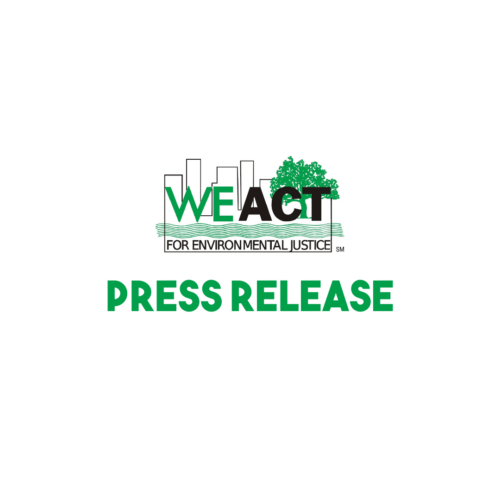First Test for New Commissioners’ Commitment to Environmental Justice
FOR IMMEDIATE RELEASE
May 16, 2024
Contact: Charlie Heller, charlie@agreeny.org, 609 933-6774
ALBANY, NY – Members of environmental and energy advocacy organizations met with the New York State Public Service Commission (PSC) today, where they delivered a letter from 150 organizations asking the Commission to make a major commitment to get energy and cost saving home improvements to more New Yorkers.
Energy efficiency – which includes insulation, air sealing, efficient appliances, and other energy and cost saving measures – is a cornerstone of the State’s strategy for achieving its climate goals. Yet the State’s energy efficiency budgets and programs are not meeting the need at a pace and scale demanded by the climate and energy affordability crises. For years, the State’s energy efficiency programs have been mired in complexity, have failed to serve low-income customers in an equitable manner, and have been too focused on gas appliances and low-hanging fruit like lighting. An order from the Commission last July signaled that the State is ready to revamp its New Efficiency: New York (NENY) program to better align with the Climate Leadership and Community Protection Act. The Order outlined a framework for spending approximately $5 billion in ratepayer-funded incentives for energy efficiency for the 2026-2030 period.
In the letter delivered today, advocates wrote: “NENY was originally developed before New York’s Climate Act and Scoping Plan. With new mandates and new Commissioners, you have the opportunity and the responsibility to reimagine NENY as not merely a program to be administered, but as an investment in our people and our future. It is essential as we move into the next phase of NENY that you hold NYSERDA and the utilities accountable to our communities’ evolving needs for an inclusive clean energy economy.”
The priorities outlined in the letter include:
- Investing in our communities by allocating 50 percent of the overall NENY budget to low-and-moderate income (LMI) households and disadvantaged communities (DAC) programs, prioritizing programs that address the economic, physical, and social barriers that residents face when trying to access energy efficiency.
- Making the programs easy to use by meeting people where they are.
- Valuing our lives, our health, our comfort, and our safety by incorporating health and other benefits into the calculations that inform investment decisions.
“Five billion dollars of rate payer money represents an incredible opportunity to make real progress to weatherize and electrify the buildings where we live, work and play. It’s essential that the funds be spent thoughtfully and strategically to reach those who need them most and to advance New York’s climate and energy justice goals. In order to succeed, programs must be designed to be easily accessible and to meet real world conditions. We look forward to working in partnership with the Commission and staff to make that happen.” said Lisa Marshall, Director of Organizing and Advocacy, New Yorkers for Clean Power.
“We urge the Public Service Commission to use its review of the multi-billion dollar New Efficiency: New York portfolio of programs as an opportunity to make design improvements to these programs that can speed New York’s transition to zero-emission heating and cooling, lower New Yorkers’ energy bills, improve New Yorkers’ health, and address long-standing equity issues,” said Malak Nassereddine, NY Senior Manager, Utility and Regulatory Policy for the Building Decarbonization Coalition.
“The New Efficiency: New York initiative can either significantly advance our climate goals or fall short – perpetuating climate vulnerability and energy insecurity. Transitioning away from fossil fuels in buildings is also crucial for protecting the health and safety of our communities. We urge the Public Service Commission to seize this opportunity to support equitable building efficiency and electrification in disadvantaged communities who have historically been overburdened by making catalytic investments in our homes, and our health,” said Eric Walker, Energy Justice Senior Policy Manager, WE ACT for Environmental Justice.
“We support the shift to prioritize deep energy retrofits and electrification in order to achieve our climate goals but acknowledge that doing so will necessitate additional funding and programs that are more streamlined for consumers and contractors. In particular, we need to expand incentives and programs in the affordable multifamily sector, so that building decarbonization is accessible to all New Yorkers,” said Betta Broad, Director of Advocacy & Organizing at Association for Energy Affordability.
The Public Service Commission has an unprecedented chance to shift our state towards a green economy, enhancing the health, comfort, and safety of New Yorkers who need it most. We urge the Public Service Commission to treat the five billion dollar New Efficiency: New York program like the life- and state-changing fund it can be.” said Jessica Azulay, Director of Alliance for a Green Economy.
“New Yorkers deserve an upgrade. We urge the Public Service Commission to improve the design of these programs so that they’re more accessible to more people and more communities across the state. Delivering better homes for our families today means better futures for all of us. We can’t afford to let this $5 billion opportunity pass by,” said Michael Hernandez, New York Policy Director for Rewiring America.
# # #
WE ACT for Environmental Justice is a Northern Manhattan membership-based organization whose mission is to build healthy communities by ensuring that people of color and/or low-income residents participate meaningfully in the creation of sound and fair environmental health and protection policies and practices. WE ACT has offices in New York and Washington, D.C. Visit us at weact.org and follow us on Facebook, Twitter/X, and Instagram.
